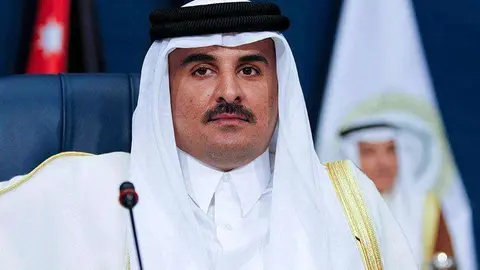Qatar continues to seek an end to Afghanistan's international isolation

In August 2021, the departure of international troops allowed the Taliban to take over the government of Afghanistan, turning it into a repressive country in terms of fundamental rights, and a situation of famine emerged that continues today. This control resulted in the country's international isolation by those countries that did not recognise the Taliban government, except for the Emirate of Qatar, which maintained relations with the militia and met with its leadership last month.
Taliban leader Haibatullah Akhundzada and Qatari Prime Minister Mohamed bin Abdulrahman al-Thani met on 12 May to resolve tensions between Afghanistan and the international community. The meeting in the Afghan city of Kandahar was the first between the Taliban leader and a foreign High Representative. The Qatari media outlet Al-Jazeera clarified that the meeting was intended to seek an end to the international isolation of the Afghans, but did not specifically mention the issues to be discussed.

The US administration is coordinating with Qatar on the issues discussed at the talks, which, according to various sources, include ending bans on women's education and employment, the main reason why many states have not recognised the Taliban government after it was installed in 2021. Haibatullah Akhundzada believes that women's rights are respected under Islamic law and although it does not seem that they are willing to compromise on this, according to the foreign minister "the meeting was very positive" and the leader is open to continue talks.
Organisations such as Human Rights Watch do not see the meeting as a sign of change from the current restrictions. The director of the Women's Rights Division at Human Rights Watch, Heather Barr, commented on her Twitter feed about the talks that "the Taliban have always been willing, yet in parallel to these talks, their repression of women/girls has continued and steadily deepened".

According to Qatar News Agency, the meeting between Qatar and Afghanistan came in the context of the country's "political role in communicating with various parties in addition to facilitating relations between the interim government and the international community and seeking to achieve security and prosperity for Afghans". In order to improve its position in the region, Qatar "seeks to arouse the interest of the West and perhaps also China and Russia in continuity as an independent state. This kind of existential security and survival is the most important motive of the Qatari state's foreign policy". It has been an international mediator for almost two decades, although it is largely dependent on the US, which supports any contact with the Taliban after the failure of talks at a lower level and seeks to prevent other international opponents from filling the Western vacuum.
Qatar has been the US's protective power in relations with Kabul, allowing on its territory negotiations between the Americans and the Taliban on the withdrawal of the international community from Afghan territory in exchange for anti-terrorism guarantees from the militia. All this was possible thanks to the political office that the Taliban opened in Doha in 2013 and which was supported by President Barack Obama. Moreover, in the evacuation of Westerners from Afghanistan with the Taliban takeover, the Qatari state offered an exit route for the Taliban, demonstrating its ability to mediate with the Taliban and making it a key player for world powers wanting to intervene in the country.









